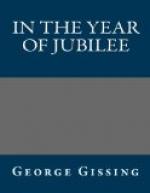There was a silence, then the girl said:
‘I meant to ask Horace to go with us.’
‘Horace—pooh!’
Again a silence. Mr. Lord laid down his cup, moved a few steps away, and turned back.
‘I didn’t think this kind of thing was in your way,’ he said gruffly. ‘I thought you were above it.’
Nancy defended herself as she had done to Jessica, but without the playfulness. In listening, her father seemed to weigh the merits of the case conscientiously with wrinkled brows. At length he spoke.
’Horace is no good. But if Samuel Barmby will go with you, I make no objection.’
A movement of annoyance was Nancy’s first reply. She drummed with her fingers on the table, looking fixedly before her.
‘I certainly can’t ask Mr. Barmby to come with us,’ she said, with an effort at self-control.
‘Well, you needn’t. I’ll speak about it myself.’
He waited, and again it chanced that their eyes met. Nancy, on the point of speaking, checked herself. A full minute passed, and Stephen stood waiting patiently.
‘If you insist upon it,’ said Nancy, rising from her chair, ’we will take Mr. Barmby with us.’
Without comment, Mr. Lord left the room, and his own door closed rather loudly behind him.
Not long afterwards Nancy heard a new foot in the passage, and her brother made his appearance. Horace had good looks, but his face showed already some of the unpleasant characteristics which time had developed on that of Stephen Lord, and from which the daughter was entirely free; one judged him slow of intellect and weakly self-willed. His hair was of pale chestnut, the silky pencillings of his moustache considerably darker. His cheek, delicately pink and easily changing to a warmer hue, his bright-coloured lips, and the limpid glistening of his eyes, showed him of frail constitution; he was very slim, and narrow across the shoulders. The fashion of his attire tended to a dandiacal extreme,—modish silk hat, lavender necktie, white waistcoat, gaiters over his patent-leather shoes, gloves crushed together in one hand, and in the other a bamboo cane. For the last year or two he had been progressing in this direction, despite his father’s scornful remarks and his sister’s good-natured mockery.
‘Father in yet?’ he asked at the door of the dining-room, in subdued voice.
Nancy nodded, and the young man withdrew to lay aside his outdoor equipments.
‘What sort of temper?’ was his question when he returned.
‘Pretty good—until I spoilt it.’
Horace exhibited a pettish annoyance.
’What on earth did you do that for? I want to have a talk with him to-night.’
‘About what?’
‘Oh, never mind; I’ll tell you after.’
Both kept their voices low, as if afraid of being overheard in the next room. Horace began to nibble at a biscuit; the hour of his return made it unnecessary for him, as a rule, to take anything before dinner, but at present he seemed in a nervous condition, and acted mechanically.




